Russia has given fresh assurances that the Syrian government has been told it must allow aid into rebel-held east Aleppo and elsewhere in Syria, but said it needed reassurances that the US was also putting pressure on Syrian opposition groups to abide by their side of the bargain.
The demands came as aid convoys remained stuck on the Syrian side of the Turkish border, unable to enter the country’s second city, where as many as 250,000 citizens are in dire need of help.
The lack of progress on aid, nearly a week after the ceasefire agreement was sealed between Russia and the US in Geneva, is putting the deal under pressure, with more reports of clashes, some inside the ceasefire area. Government-held areas were shelled in the north-eastern Damascus neighbourhood of Qaboun, wounding three people, Syrian state media said.
The aid impasse came as Russia put pressure on the US to release the detailed text of the agreement and urged Washington to allow the agreement to form the basis of a UN security council resolution next week. The US believes that it is inadvisable to release the wording, but the French government is pushing to see the agreement, arguing that it would be impossible for the security council to endorse an agreement without knowing the details.
Syria and the refugee crisis will dominate the annual UN general assembly when it begins next week in New York.
It had been hoped that by the time the assembly met, aid would be flowing in Syria, the ceasefire deepening and a new era of Russia-US military cooperation possibly under way, with the two sides jointly staging airstrikes against Islamic State and other targets.
But reporters in Aleppo said no movement could be seen on the rubble-strewn Castello Road, the main route for humanitarian assistance into the east of the city. There were reports that Russians had taken over key checkpoints from the Syrian government, but it was not clear whether this was a precursor to handing them over to the Red Crescent humanitarian group, a key demand of the local council.
The council has objected to the presence of Russian troops in the area and any attempts to look at the content of aid trucks.
The UN had hoped that 40 trucks of food, enough to feed 80,000 people for a month, could be delivered to rebel-held eastern parts of Aleppo as soon as possible.
David Swanson, a spokesman for the UN office for the coordination of humanitarian affairs, said: “The challenge we continue to face, and this is the very sad reality, is ensuring all parties to the conflict, and those with influence over them, are in agreement.”
In briefings in Moscow, Russia insisted that it had done everything required to meet its obligations under the Geneva agreement.
Russia also claimed that the US had not yet provided the Russian military with accurate data on the exact location and number of the “moderate opposition” in Syria. Moscow said the US had provided only lists of the fighting units that it supported and suggested that the Americans may be reluctant to hand over intelligence that could be used by the Syrian air force if the ceasefire collapses.
In practice, many of the opposition groups deemed moderate by the US are working in tandem with Jabhat al-Nusra, which renamed itself Jabhat Fatah al-Sham after splitting from al-Qaida.
Many opposition groups have refused to separate themselves from Jabhat Fatah al-Sham until further details of the agreement are revealed, or other assurances given.
On Thursday, the Pentagon press secretary, Peter Cook, said discussions on a joint US-Russia centre to coordinate attacks on extremist groups, to include Isis and the former al-Nusra front, had not begun. The terms of the ceasefire, particularly the flow of humanitarian aid, must be met before the centre can be discussed, he said.
US defence officials have been examining the details of the coordination, including whether the US would be liable for Russian airstrikes that it had jointly agreed upon.
Under a measure that US lawmakers inserted into a defence appropriations bill after Russia’s military incursion into Ukraine, military-to-military cooperation with Russia is prohibited, unless the US defence secretary waives its provisions, notifies Congress and explains why the waiver is in US interests.


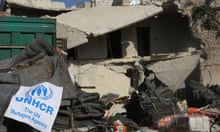
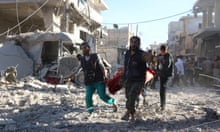
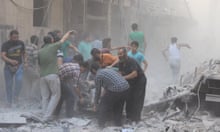


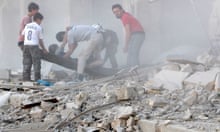
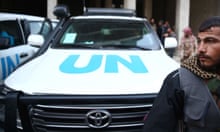
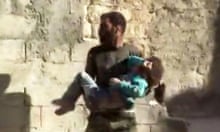
Comments (…)
Sign in or create your Guardian account to join the discussion